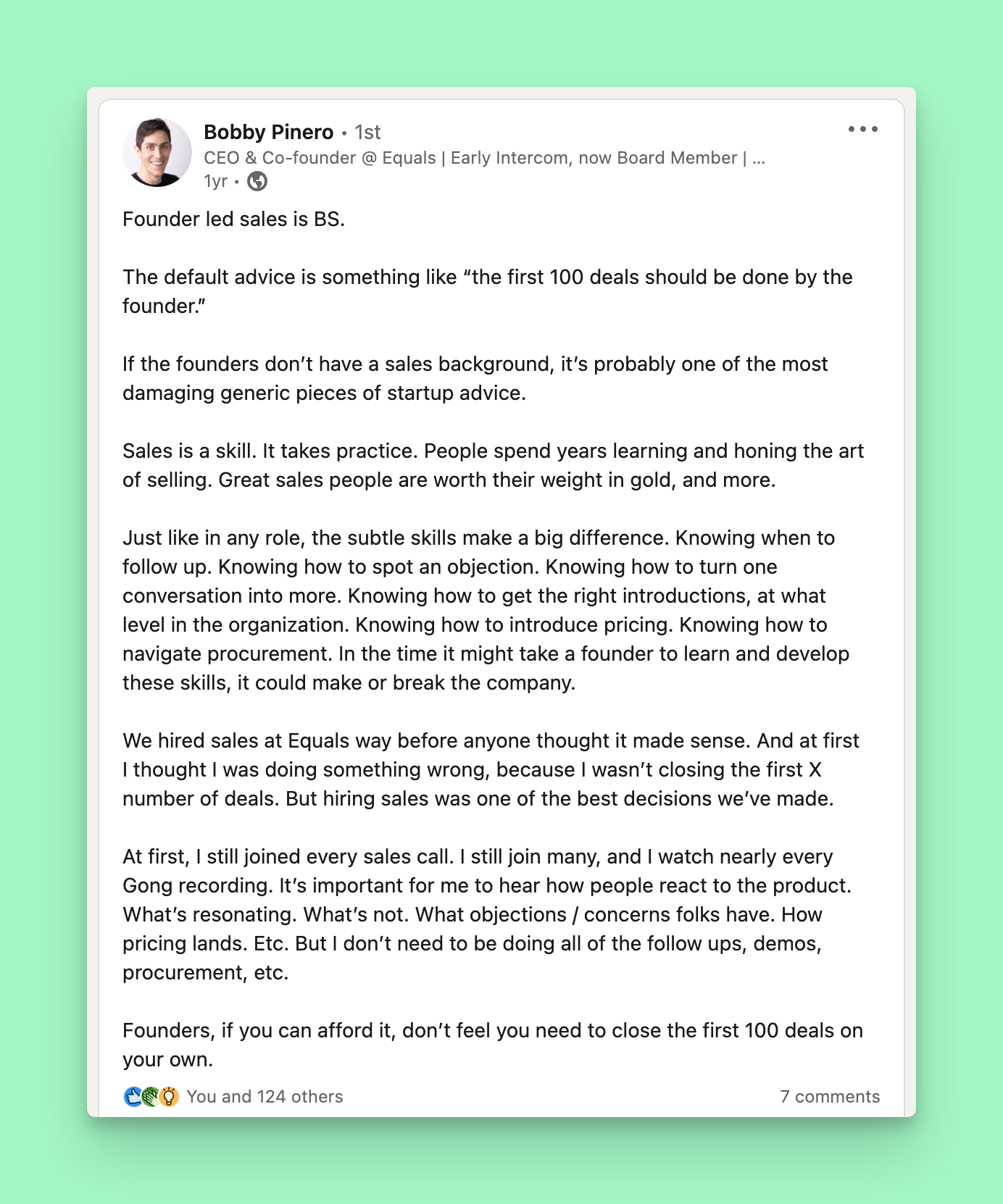Reflections on building Equals, 3 years in
This week, Equals turns three. And as any parent of a 3-year-old understands, it’s gone by in a flash, and I also can’t quite remember life before it.
Similar to becoming a parent, nothing anybody tells you about startup life can prepare you for the journey – the stress, the uncertainty, the joy, and the existential fear. You know, the easy stuff.
Yet it’s cathartic to share our experiences. Just as there’s a plethora of parenting advice, there surely are some things we can learn from one another as builders. Just be careful who you listen to (that’s a whole post for another day).
So, three years into this journey, I share some reflections. Three things we got right. Three mistakes we made. Three things that have me fired up. A classic shit sandwich. Let’s go!
3 things we got right
1. We actually built the spreadsheet.
From the moment we started Equals, we decided we were going to rebuild the spreadsheet from scratch. When talking to investors or advisors, this was always the most scrutinized part of our plan.
Even early Cellmates (an Equals teammate) questioned the decision. “Shouldn’t we just ship an MVP spreadsheet? Why do we have to rebuild the whole thing?”.
Yet we stuck to our guns. We spent nearly 18 months heads-down, secretly building a spreadsheet with nobody using it. And no feedback. We were all in–committed to the full build.
In doing so, we’ve built a platform that extends far beyond just a spreadsheet. Dashboards being one example, Command+K another.
I’m very grateful that we didn’t compromise on our ambition. You can’t build a truly disruptive product as a plug-in. We’re poised today to build a generational company.
2. We invested in our brand.
I love our brand. I’m so damn proud of it. It’s fun, colorful, bright, and playful–it stands out. But most importantly, it’s us. It’s one of the most prominent things that makes Equals, Equals. And that’s exactly what we set out to achieve. We started from a place of – what gets us most excited? What would we be proud to share with the world? In a world of startups that all look like Stripe and Linear, we felt compelled to do something different and pay homage to the software we grew up with.
How do you know if your brand is good? You’re proud and excited to share it with the world. How do you know it’s really good? You inspire others. You’re a trendsetter. We’ve started to spot some Equals-inspired branding pop up in the wild (without naming any names!), and we’re flattered. :)
3. We committed to content from the beginning.
My best commitment when starting Equals was to one of our angels, Des. In exchange for a check, he made me promise that in the early days, we’d publish a blog post every week. It’s a practice he also did at Intercom.
It’s important to note that the message was not “go build a content marketing channel.” Dear lord, most content marketing sucks. The advice was simply to write. Its purpose; to build the habit of telling our story, to get over the fear of publishing, and most of all, to test what resonates. As we developed that habit, we quickly learned what lands–sharing openly the lessons we’ve learned in building startups.
Most content is designed to serve the company, not the reader (🤮 most company blogs)–it’s so damn stupid. Instead, write something you’re proud to ship. Write something you’d want to read. Do so with the intent to help and inspire others. It’s harder, but that’s what makes it worthwhile.
3 mistakes we made
1. We thought founder-led sales was bullshit.
In late 2022, I posted on LinkedIn that “founder-led sales is BS”. The main message; sales is a skill. It’s something developed and honed over many years.
While it’s true that a salesperson knows how to run a process to close a deal effectively, it’s the role of the founder to work out how to sell the product. Scaling comes after. And there’s absolutely no substitute for:
A founder doing deep discovery with a prospect–getting to the need and payoff for a problem to be solved.
Connecting with a prospect on why their solution wins.
Staying intimately connected to the questions prospects ask, the words they use, and the objections they raise.
I had removed myself too quickly from that process, which hurt our selling ability and slowed our feedback cycle.
Both Ben and I are now involved in nearly every first sales call. And now I take it back–founder-led sales is not BS.
2. We thought building our own integrations would be easy.
From the get-go, we set out to build Equals for founders and operators–folks who aren’t data engineers and need a practical, easy-to-set-up and maintain data solution. As such, one of our core beliefs was that Equals should connect to your data wherever it lives.
It turns out there’s a lot of work and a lot to build to get to a place where data is not only accessible but also useful. We started down a path in which we built and maintained every one of our integrations. It was painful. Now, we partner with Fivetran and Snowflake to unload much of that burden.
We’ve also understood that it’s not enough to simply make data accessible. It must also be accessible in a format that folks understand and/or with the tooling to transform it into what they need. We didn’t foresee this being an area where we’d need to invest so heavily. But in some ways, we could only learn this by onboarding hundreds of customers to Equals.
Knowing what we now know, some big things are coming this year that’ll make it much easier to get started with Equals and have really simple-to-use data from the get-go.
3. We thought freemium would just work.
For nearly a year, we made Equals free to get started. It tanked our business. We’ve since recovered, but it wasn’t easy.
It is probably our most documented failure at Equals. Lenny covered it. So did Every. Freemium supporters came at us, up in arms, while many other founders shared similar experiences. We’ve written all about why it failed. And why more friction in your onboarding is often better.
Perhaps it was all just a ploy?
I guess you’ll never know.
3 things that have me fired up
If you’re an Equals customer, you have a lot to look forward to this year. If you haven’t considered Equals yet, prepare for some serious FOMO.
1. We’re building a new way to explore your data freely and flexibly.
Equals is already a tool that makes data accessible to anyone within a company–speeding up (and improving) decision-making and freeing up analysts’ time. This year, it’ll go to another level. SQL. Or no SQL. Data from any source. It’s seriously epic.
2. We’re moving beyond the spreadsheet and the dashboard.
What’s one of the most daunting parts about building early-stage analysis? Organizing and centralizing your data. We already solve this problem in some ways. We will make it 10x easier this year. Implementing a best-in-class data stack will soon be possible for anyone.
3. We’re solving the MOST painful part of working in Excel.
THE MOST PAINFUL. You’ve never seen a spreadsheet do this. And it’s something we’re uniquely positioned to solve. You’ll know it when you see it. Any guesses?
Thank you. All of you.
None of this is possible without the team and our customers. Three years in, the greatest thing we’ve accomplished is building a product that has a positive impact on our customers–every day. As an analyst at heart, I’m fired up to give folks a tool that helps them make faster, better decisions across their business. One that makes it fun to chase down an analysis and share it with your team. Similarly, I’m grateful to all of our Cellmates who've bet on our crazy, wild ambition and dedicated their working lives to standing up for this company. Thank you.
Happy birthday, Equals.
🥳











Happy 3rd Birthday Equals!
Hope there are plans for a 4th birthday party in Australia?? Would love to be part of the team that eradicates clunky spreadsheets from the world!
Happy Birthday to Equals! 🎉